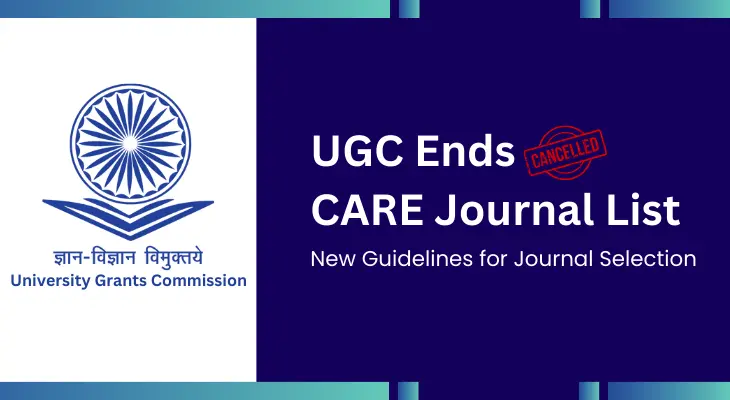
The University Grants Commission (UGC) has announced a major change in how it evaluates research journals. It has discontinued the UGC-CARE journal list and is introducing a new system for journal selection. This decision is aimed at improving research quality, increasing academic freedom, and making journal selection more flexible for researchers in India.
For years, researchers had to choose journals from the UGC-CARE list to meet academic requirements. However, many experts criticized this system for limiting options, lacking transparency, and excluding reputable journals. To address these concerns, UGC will now provide general guidelines instead of a fixed list.
Instead of maintaining a centralized list of approved journals, UGC is introducing a set of parameters to help universities, colleges, and researchers select credible peer-reviewed journals. This shift allows greater flexibility and encourages scholars to focus on journal quality rather than just inclusion in a list.
The new system is designed to:
UGC has opened its proposed guidelines for public consultation until February 25, 2025. Faculty, researchers, higher education institutions, and students are invited to submit their opinions to help refine the new policy.
The UGC-CARE list was launched in 2018 to prevent low-quality or predatory journals from being used for academic purposes. However, over time, several problems arose:
By removing the UGC-CARE list, UGC hopes to fix these issues and create a more open and fair research environment.
This marks a big shift in UGC’s approach to research publication. Instead of controlling journal choices, UGC is now empowering institutions and researchers to make informed decisions.
The removal of the UGC-CARE journal list is a major step towards academic freedom and better research quality. By introducing open guidelines instead of a fixed list, UGC aims to improve transparency, give institutions more control, and allow researchers to publish in journals that best suit their work.
Researchers and institutions should stay updated with UGC’s official notifications for the latest guidelines on journal selection.
For authors struggling to find relevent UGC Care List, IJOER offers a credible, efficient, and impactful alternative. Instead of facing delays and uncertainties, researchers can share their findings promptly and contribute to advancing their fields. Publishing in IJOER ensures that your work reaches an international audience without unnecessary hurdles.

|
Citation Indices
|
All
|
Since 2020
|
Citation |
2359 |
1680 |
h-index |
19 |
15 |
i10-index |
57 |
24 |
|
Acceptance Rate (By Year)
|
|
|
Year
|
Percentage
|
|
2023
|
9.64%
|
|
2027
|
17.64%
|
|
2022
|
13.14%
|
|
2021
|
14.26%
|
|
2020
|
11.8%
|
|
2019
|
16.3%
|
|
2018
|
18.65%
|
|
2017
|
15.9%
|
|
2016
|
20.9%
|
|
2015
|
22.5%
|